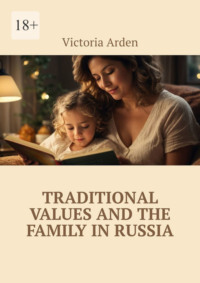Читать книгу: «Traditional values and the family in Russia»
© Victoria Arden, 2025
ISBN 978-5-0067-9412-2
Created with Ridero smart publishing system
This book is an in – depth study of the historical, cultural, religious, and social foundations of the Russian family and traditional values. She examines how the concepts of family, marriage, parenthood, and morality have been shaped over the centuries by Orthodoxy, government policy, the peasant way of life, and the Soviet experiment. The book is not ideological propaganda, but strives for an objective analysis.: what are «traditional values» in the Russian context, how do they manifest themselves today, how do they change under the pressure of modernity, and how do they affect everyday life? The book is intended for readers interested in history, sociology, culture, and family politics, as well as for those who want to understand what lies behind modern discussions about the family in Russia.

Introduction: What does «traditional values» mean in Russia?
The word «traditional» is heard everywhere today: in public speeches, in the media, in conversations, in schools. It has become part of the political and social lexicon. But what does it really mean? What is hidden behind this term when it is used in the Russian context? This is not just a buzzword, not an empty slogan, but a complex, multifaceted set of beliefs, norms, and behavioral models that has been formed over the centuries. It is not something frozen, but is constantly being rethought, adapted to new realities, but at the same time retains its foundation. Understanding «traditional values» is not about acceptance or rejection, but about trying to figure it out.: what it is, where it came from, and how it affects people’s lives today.
In Russia, the concept of «traditional values» has its own characteristics that distinguish it from the Western understanding. In the West, especially in countries with liberal democracies, the emphasis is often on individual rights, freedom of choice, and personal autonomy. There, values can be more decentralized, where each person determines for himself what is important to him. In the Russian understanding, the center of gravity is shifted in the other direction: to the collective, to the family, to continuity, to duty to society and ancestors. The main pillars are family, faith, patriotism and respect for elders. The family here is not just a union of two people, but a cell of society, a place where personality is formed, knowledge and experience are transmitted. Faith is not necessarily a strict observance of religious dogmas, but rather a spiritual foundation, a sense of belonging to something more. Patriotism is not only love for the Motherland, but also a sense of responsibility for its fate. And the continuity of generations is the belief that the present is built on the past, that history, the memory of ancestors, and traditions that have come from the depths of time must be respected.
The historical roots of these values go deep into time. One of the main sources is Orthodoxy. It is not just a religion, but a fundamental part of the cultural code. Orthodoxy formed ideas about good and evil, about duty, about humility, about the value of suffering and sacrifice. It strengthened patriarchal foundations, where the father of the family was the head, the mother was the keeper of the hearth, and the children were the progenitors of the family. Another important source is the peasant community, or «the world.» It was a self-regulating system where decisions were made collectively, where agreement, mutual assistance and support were important. Individualism in this way was undesirable, but solidarity was necessary. This model has left a deep mark on the mentality: the ability to live in a team, respect for elders, responsibility for the common cause. The third source is the imperial idea. A great power that guards its borders, protects its interests, and is united under a strong government. This idea forms the idea of the country as a fortress that needs to be protected from external influence, from «alien» ideas that can destroy it.
That is why the topic of family and traditions has become central to the modern Russian agenda. In the context of global changes, economic instability, and cultural pressure from outside, traditional values are becoming a pillar. They give a sense of stability, clarity, and confidence that there is something immutable. The state, realizing this, has actively incorporated this topic into its ideology. Family, having many children, faith, and patriotism have all become part of official policy, supported by laws, support programs, and mass propaganda. Maternity capital, awards for having many children, lessons in the «Fundamentals of Orthodox Culture», and Victory Day celebrations – all these elements work to strengthen the traditional model of society.
However, the purpose of this book is not propaganda or idealization. Her goal is to understand. To understand what really lives in the hearts of people, and what is just rhetoric. What is preserved from the past, and what is changing under the pressure of modernity. How a family lives in a village and in a megalopolis. How young people perceive traditions, and why they are needed in the 21st century. The book will not claim that the old is always better than the new. She will not condemn those who choose a civil marriage or remain single. Her task is to show that traditional values are not a dogma, but a living process. This is what people choose, preserve, and adapt. And to understand Russia today, you need to understand what family, faith, patriotism and memory of the past mean to its inhabitants.
Бесплатный фрагмент закончился.
Начислим
+12
Покупайте книги и получайте бонусы в Литрес, Читай-городе и Буквоеде.
Участвовать в бонусной программе
